INT’L DAY OF HAPPINESS: Salesian Missions programs promote well-being for youth
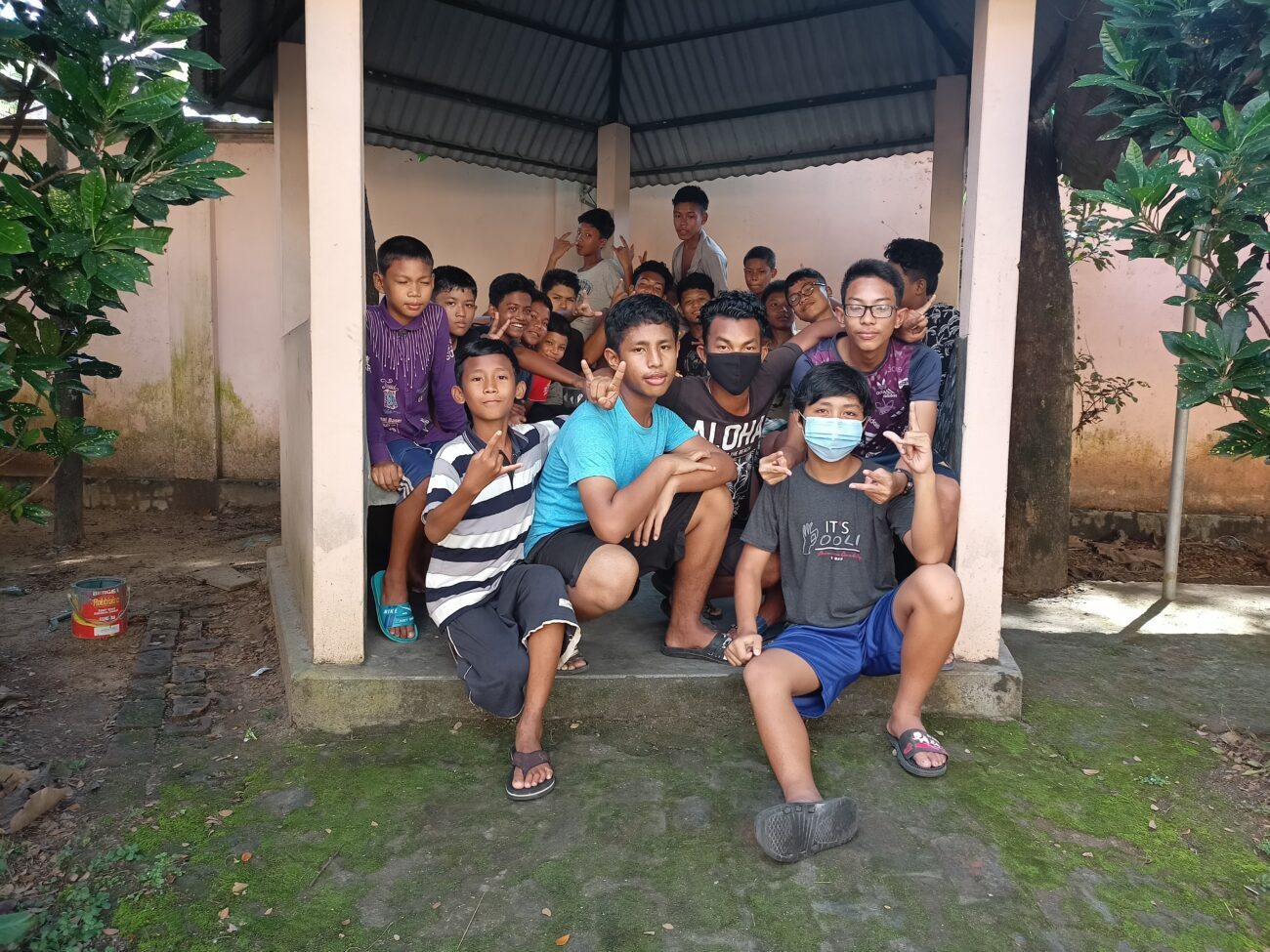
Salesian Missions highlights programs that empower youth, giving them a sense of well-being and happiness
(MissionNewswire) Salesian Missions, the U.S. development arm of the Salesians of Don Bosco, joins humanitarian organizations and countries around the globe in celebrating International Day of Happiness, which falls each year on March 20. In 2011, the United Nations General Assembly adopted a resolution that recognized happiness as a “fundamental human goal” and called for “a more inclusive, equitable and balanced approach to economic growth that promotes the happiness and well-being of all people.”
The day is coordinated by Action for Happiness, a nonprofit movement of people from 160 countries, and is supported by a partnership of like-minded organizations. It was founded as a way to inspire, mobilize and advance the global happiness movement. In 2015, the U.N. launched the 17 Sustainable Development Goals that seek to end poverty, reduce inequality and protect the planet—three key aspects that lead to well-being and happiness.
Each year, International Day of Happiness focuses on a particular theme. This year the theme is “Build Back Happier” and focuses on self-care and working to make well-being an overall priority in life.
“For youth to be happy and have a sense of well-being, they must feel valued and have their voices heard,” said Father Gus Baek, director of Salesian Missions. “Youth must also have their basic needs met. Salesian missionaries meet the basic needs of disadvantaged and at-risk youth who often have nowhere else to turn. They provide education and skills training in addition to social and workforce development services to ensure a positive transition into adulthood.”
In celebration of International Day of Happiness 2022, Salesian Missions is proud to highlight Salesian programs that educate and empower youth.
BANGLADESH
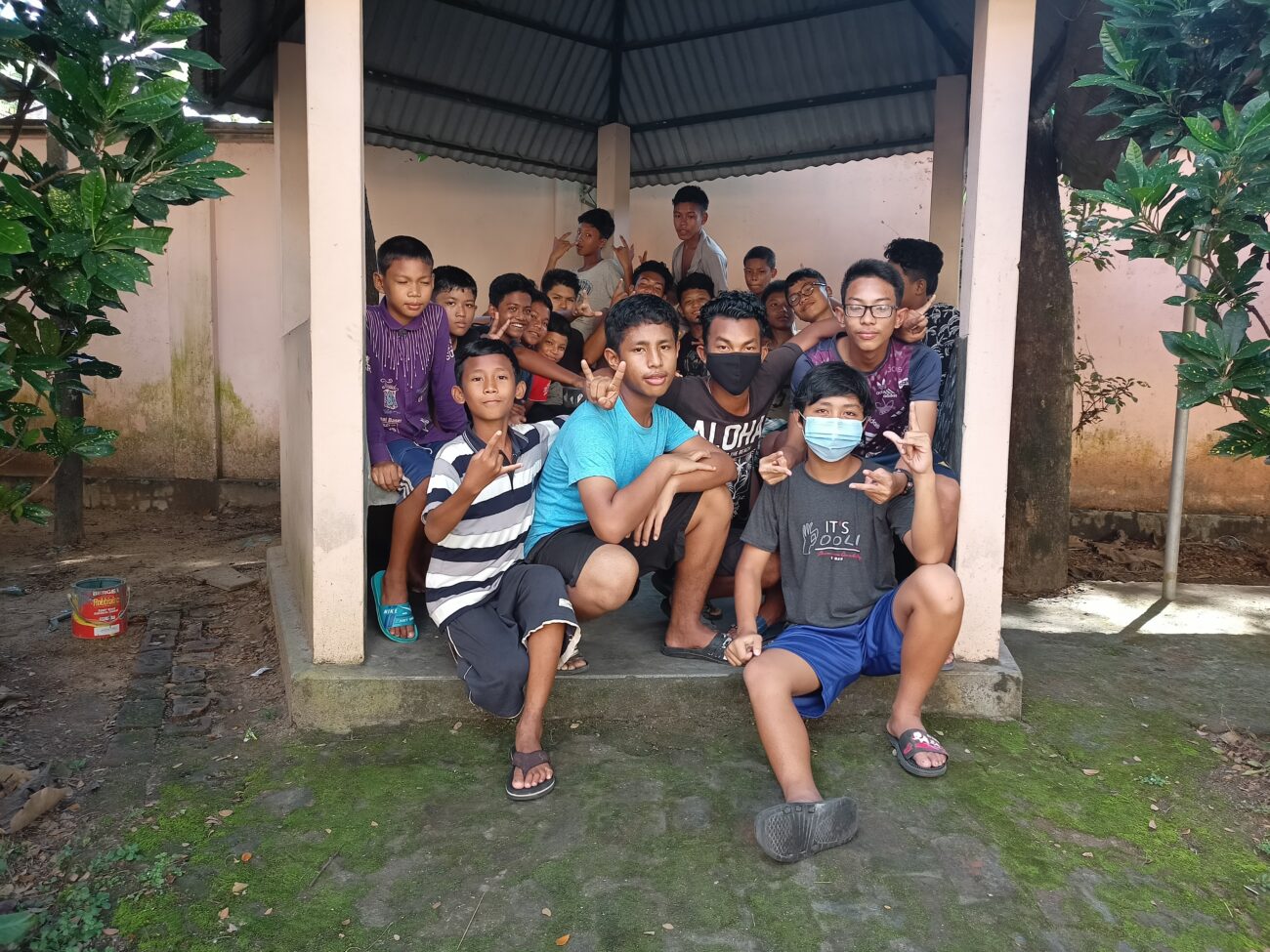
Boys staying in the Salesian-run Blessed Zepherino Hostel in Bangladesh receive education and shelter.
Boys staying in the Salesian-run Blessed Zepherino Hostel in the Utrail-Telunjia community of Bangladesh received support from donor funding from Salesian Missions. The boys come from poor backgrounds and their parents are daily laborers who work to earn enough money each day to buy food. Other boys are abandoned or orphaned.
For those in need, Salesians offer help for room and board or provide it free of charge. The hostel relies on donor funding to help fill the gaps in funding. Some of the boys living at the hostel are studying at the Salesian St. Xavier School. Once they pass eighth grade, they can continue up to grade 12 at the Salesian high school and college. Every year, the Salesian hostel hosts 50 to 60 boys.
Father Dang Lam, a Salesian missionary who operates the hostel, said, “Many parents want to send their children to the Salesian hostel because they know that their children will receive a good education in our school and Christian human formation in the hostel.”
CAMEROON
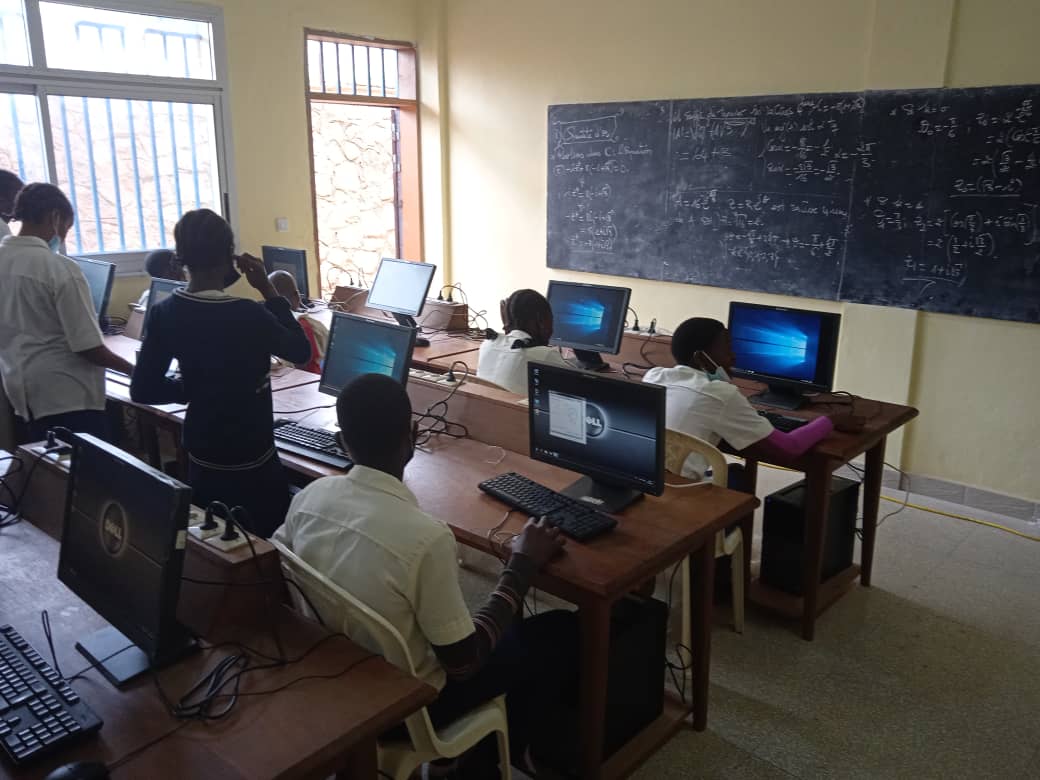
Students learn computer science with added equipment at Don Bosco College Mimboman in Yaoundé, Cameroon.
More than 500 youth attending Don Bosco College Mimboman in Yaoundé, Cameroon, have access to additional computer equipment thanks to donor funding from Salesian Missions. Prior to the donation, there were only 20 computers available to the students in the new school, which opened this academic year. With the funding, 55 computers will be available so more students can enroll in the computer science class.
“This is the first time that our students are learning computer science using a computer,” said Father Sabé José Maria, economer at the college. “Our students have been studying computer science throughout the year without using a desktop or similar device. Now, we are thrilled that they can do so, and students are very excited about it. On behalf of our student population, we truly appreciate your help to make this situation a reality.”
Fr. Maria added, “Very few schools in Yaoundé have computer resources at their disposal. We dream of providing two computer rooms with 55 computers in each room. This would give our school the golden opportunity to offer computer science education of quality, in order for our students to be properly trained, as they deserve.”
The school provides education for vulnerable youth in the Mimboman neighborhood of Yaoundé. A three-story building includes 12 classrooms, laboratories and offices, and it is allowing more youth to attend school in the region. A new building also provides space for additional educational programs including a bachelor’s level course.
NAMIBIA
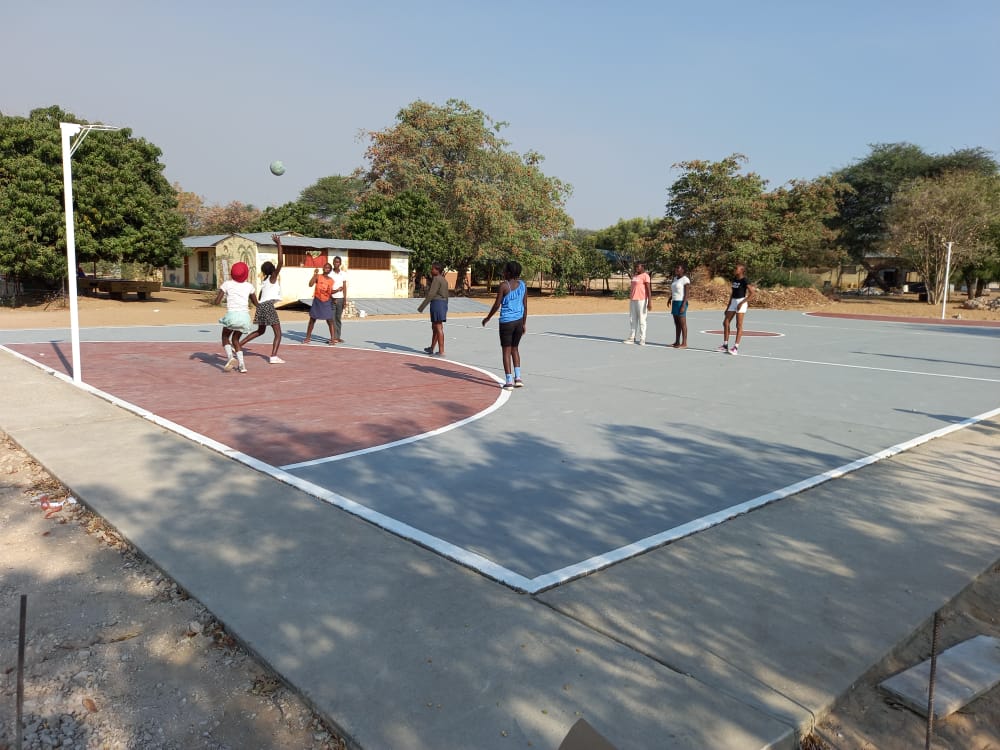
In Namibia, Don Bosco Youth Center’s renovated playground gives children and youth a place to play and connect with their peers.
Don Bosco Youth Center in Rundu, Namibia, has renovated a children’s playground thanks to donor funding from Salesian Missions. Prior to the renovations, the playground was in a dilapidated state and dangerous, leaving children without a place to play and connect with their peers.
With the donor funding, Salesians were able to buy renovation materials and paint. The children who attend the youth center come very poor families and some of them have been abandoned. Since the launch of the primary school, close to 120 children use the playground each morning before school. On the weekends, 180 youth attending programs at the youth center utilize the playground. To safeguard the playground, Salesians have asked the school to contribute a small amount of money toward the maintenance.
Don Bosco Youth Center was opened in 2002, and provides shelter and services for homeless youth. The center offers computer classes for 65 students, pre-school for 70 children and school for 104 students who have dropped out of formal education. In addition, more than 80 youth attend the daily oratory activities including sports programming.
NIGERIA
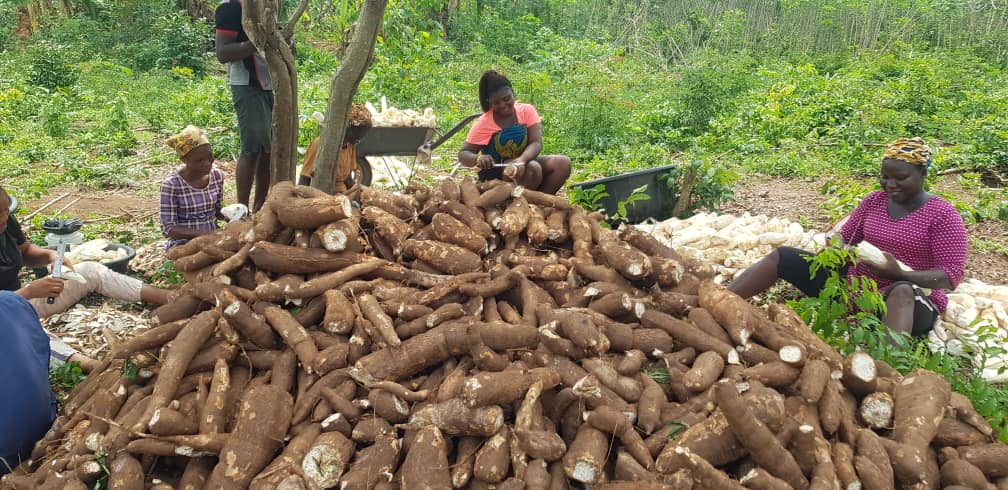
A Salesian farm in Nigeria is helping poor women and unemployed youth gain skills with hands-on training.
Salesian missionaries have developed the St. Joseph’s Farm, in Sagamu, Nigeria, thanks to donor funding from Salesian Missions. The farm is a center for training, research and production on 25 hectares of land acquired by the Salesians. Forty farmers received training in better methods of crop production to help improve production and revenue. A piggery and fishery were also constructed with this funding.
St. Joseph’s Farm assisted poor women and unemployed youth from the local area and provided training and hands-on help with farming techniques. In addition, the project helped small farmers develop skills to manage their farms for increased productivity, self-employment and sustainability.
With a population close to 256,000, including a mix of Christians, Muslims and traditionalists, Sagamu is known for its agricultural products such as cocoa and kola nuts. The region’s rich vegetation and large masses of unoccupied or unused land attract people who develop an interest in agriculture. Yet, the region has high rates of unemployment and underemployment, as well as a low rate of formal education.
###
Sources:
Photos courtesy of Salesian Missions (contact for usage permissions)
BANGLADESH: Poor youth receive support from donor funding from Salesian Missions
International Day of Happiness
NAMIBIA: Don Bosco Youth Center renovates playground thanks to donor funding from Salesian Missions
NIGERIA: Salesians develop farm thanks to donor funding from Salesian Missions




